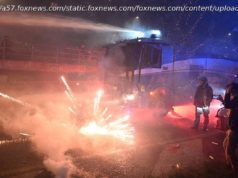Hawaii’s false alarm should alarm us all: Our view
The specter of annihilation only minutes away was visited on Hawaii over the weekend when state emergency officials accidentally text-alerted the public that a „ballistic missile threat inbound to Hawaii. Seek immediate shelter. This is not a drill.“
People did what human beings might be expected to do in such terrifying circumstances. They flooded roadways, crowded into concrete structures, or ran to police stations. One family hid in a steel shipping container. Others knelt in church and began to pray. One couple retired to their bedroom, exchanged vows of love, and waited for whatever was coming.
It took 38 minutes — an eternity for anyone imagining an ICBM bearing down — before officials issued a false-alarm text. Not only does the blunder demand accountability for those responsible and a review of the nation’s wireless emergency alert system, it reminds the world how easily two skittish adversaries can slip into unintentional, calamitous war in the digital era.
HAWAII: We’re seeking solutions, not retribution
Hawaii’s emergency management administrator, Vern Miyagi, said an unnamed state worker clicked the wrong screen button during a shift change and “ this guy feels bad, right?“ Feels bad? No kidding. That employee has been reassigned.
The Federal Communications Commission’s promise of a full investigation is vital. The nation’s wireless alert system that went operational in 2012 has shown problems with either overly broad, panic-sowing alerts (as occurred during Hurricane Harvey) or no alerts at all (as occurred during some of California’s wildfires). For the system to work, people have to believe that it is credible and competently managed.
If nothing else, Saturday’s fiasco reinforced the need to avoid loose talk about nuclear buttons on social media at a time of high tension.
These kind of fast-paced failures can create conditions that might trigger accidental war. As a New York Times analysis explains, intercontinental ballistic missiles reach their targets so quickly — within minutes — that a nation that hesitates during a crisis risks losing its arsenal to a first strike.
U. S. leaders have already openly contemplated preventive strikes against a North Korean regime arming itself with ICBMs capable of reaching Hawaii or the American mainland. Much as some Soviet leaders suspected in 1983 that the U. S. had lured Moscow into shooting down Korean Air Flight 007 as a pretext for an attack on the USSR, North Korean leaders could have first interpreted the faux Hawaiian alert as an excuse by Trump to „totally destroy North Korea,“ as he threatened in a speech before the United Nations .
They would have been terribly wrong. But given that such a feared attack by Washington was only minutes away, Kim Jong Un could have decided that his only choice was to launch his small stock of nuclear-tipped warheads, or to rain conventional missiles down on Seoul.
These are the times we live in. Saturday’s false alarm in Hawaii should alarm us all.
USA TODAY’s editorial opinions are decided by its Editorial Board, separate from the news staff. Most editorials are coupled with an opposing view — a unique USA TODAY feature.
To read more editorials, go to the Opinion front page or sign up for the daily Opinion email newsletter. To respond to this editorial, submit a comment to letters@usatoday.com .
If you can’t see this reader poll, please refresh your page.






